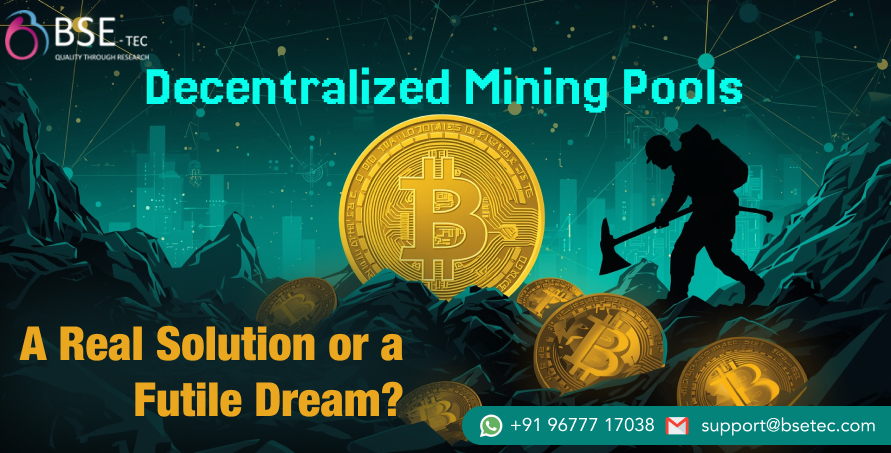
As blockchain technology evolves, so do the mechanisms that secure its networks. One of the most crucial components of Proof-of-Work (PoW) blockchains is mining pools. Traditionally centralized, these pools dominate the computational power behind major cryptocurrencies like Bitcoin and Litecoin. But with growing concerns around centralization and security risks, a new idea is gaining traction — Decentralized Mining Pools.
At BSEtec, a leading blockchain development company, we’ve been closely tracking this evolution. In this blog, we explore whether decentralized mining pools are a real solution to the industry’s challenges, or simply a futile dream.
What is a Mining Pool?
A mining pool is a collective of miners who combine their computational power to increase their chances of solving the cryptographic puzzles needed to validate transactions. Once a block is mined, the reward is distributed proportionally among all participants.
However, the centralization of mining pools—where just a few entities control over 50% of the hash rate—poses significant risks, including the dreaded 51% attack.
The Rise of Decentralized Mining Pools
What Are They?
Decentralized mining pools aim to remove the single point of control found in traditional pools. Rather than relying on a central coordinator to distribute work and rewards, decentralized pools use peer-to-peer protocols, smart contracts, and blockchain-based coordination mechanisms.
Key Features:
- No central operator
- Payouts via trustless smart contracts
- Use of Stratum V2 and P2Pool-like models
- More transparency and fairness
Why Decentralized Pools Are Needed
At BSEtec, we’ve identified several pain points in the current mining landscape that decentralized pools attempt to solve:
- Preventing Centralization : Few major pools dominate Bitcoin’s network. This is dangerous for a technology that thrives on decentralization.
- Censorship Resistance : Centralized pools can be pressured to censor transactions, threatening blockchain neutrality.
- Security and Privacy : Decentralized pools reduce the risk of a single point of failure or malicious pool operators.
- Fair Payout Mechanisms : Trustless smart contracts ensure fair distribution of rewards without human bias.
Challenges Facing Decentralized Mining Pools
Despite the promising benefits, the current state of decentralized mining pools is far from perfect.
- Low Adoption Rate : Most miners still prefer centralized pools due to ease of use, higher stability, and consistent payouts.
- Technical Complexity : Running or joining a decentralized pool often requires more technical knowledge and setup time.
- Network Latency : Coordinating mining jobs without a central server can lead to delays, stale shares, and reduced profitability.
- Lack of Incentives : Miners seek efficiency and profit. Unless decentralized pools can compete in these areas, adoption will remain low.
Promising Projects and Innovations
Several projects are working to bring decentralized mining to life:
- Ocean: A newer Bitcoin mining pool advocating for decentralization.
- Stratum V2: A protocol upgrade allowing miners to select their own transactions (job negotiation), increasing decentralization within centralized pools.
The BSEtec Perspective: Is This the Future?
At BSEtec, we believe decentralized mining pools are not a futile dream — but a vision still in its infancy. Like many blockchain innovations, they face hurdles, but the underlying need for decentralization is strong and growing.
We encourage forward-thinking developers, blockchain startups, and crypto miners to:
- Support open-source decentralized pool projects
- Experiment with Stratum V2 implementations
- Engage with blockchain communities pushing for mining reform
As a blockchain development company, BSEtec is committed to building tools and platforms that support transparency, fairness, and decentralization—the core values of blockchain.
Decentralized mining pools offer a powerful vision for the future of blockchain: one where power is truly distributed, and trust is built into the system. While challenges exist, ongoing innovations could pave the way for these pools to become the standard, not the exception.
The question isn’t whether decentralized mining pools are feasible—it’s whether the community is ready to prioritize decentralization over convenience.
Need Help Building a Decentralized Mining App or Platform?
Contact BSEtec, your trusted blockchain development partner, for custom mining solutions, smart contract development, and secure blockchain infrastructure.
#decentralized mining pools # blockchain mining pools # future of blockchain mining #mining pool centralization #Stratum V2 #decentralized blockchain #blockchain development company #BSEtec